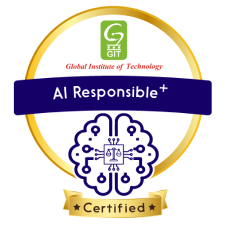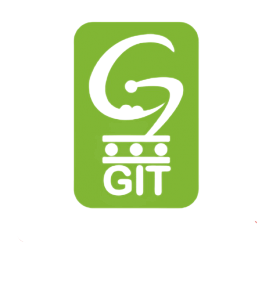
Responsible ai
Are you ready to embark on a transformative journey into the world of Artificial Intelligence (AI)?
NEXT STARTS
Enrollment is ongoing. Join today—spots are filling fast!
PROGRAM DURATION
80 Hours
LEARNING FORMAT
Online Bootcamp
Course Description
The Global Institute of Technology ‘Responsible AI ‘ is a Foundational Certification program designed to prepare learners to understand the use of AI in a responsible way. As AI’s usage becomes widespread its users and AI/ML engineers need responsible AI frameworks for safe and ethical use. This course provides a 40-hour education of theory and practice wherein students begin by learning about the societal impact of AI and ethical guidelines. Then we explore the legal and regulatory as well as ethical frameworks. Bias is overcome to instill fairess into AI through data examination, and data confidentiality and privacy are also building blocks of responsible AI. Bias, non-compliance and unethical practices can also arise in model development and AI system’s life cycle. Besides theory, students will also learn about the importance of critical thinking and contextual evaluations through hands-on exercises and labs. Students will also learn about the emerging practice of AI governance as well as emerging software practices including responsible AI as a service.
The course includes a plenty of practical exercises, case studies, and group discussions where possible to keep the course engaging and relevant. Additionally, we will provide recommended readings and resources for students who want to delve deeper into specific topics. We regularly assess student understanding through quizzes, assignments, and a final exam to ensure they grasp the material.
Course Objectives
Upon completing this Responsible (AI), participants will:
- Understanding AI Impact and The Need for Responsible AI
- Delve into Ethical Frameworks in AI
- Explore Bias and Fairness in AI with a case study.
- Address issues around Data Collection and Modeling
- Examine Transparency and Accountability
- Navigate AI Governance and Compliance with a case study
- Know Responsible AI Tools and Frameworks
- Understand the concepts of Building Responsible AI
- Evaluate Future Trends in Responsible AI
- Implement Responsible AI
By the end of this course, participants will have gained a comprehensive understanding of Responsible AI and its future trends

Prerequisites
The student must have taken ‘Fundamentals of Artificial Intelligence ‘ course for better understanding of Responsible AI
Course Duration
40 Hours
Prerequisites
The student must have taken ‘Fundamentals of Artificial Intelligence ‘ course for better understanding of Responsible AI
Course Duration
40 Hours
Course Contents
40-hour course on Responsible AI. This plan is divided into five weeks, with each week covering different aspects of Responsible AI:
1. Understanding AI and Its Impact (2 hours)
- Definition and basics of Artificial Intelligence
- The societal impact of AI
- Ethical considerations in AI
2. The Need for Responsible AI (2 hours)
- Why Responsible AI is essential
- Real-world examples of AI gone wrong
- Legal and regulatory frameworks
3. Day 3: Ethical Frameworks in AI (2 hours)
- Introduction to ethical theories (utilitarianism, deontology, virtue ethics)
- Application of ethical theories in AI
- Case studies on ethical dilemmas in AI
4. Bias and Fairness in AI (2 hours)
- Understanding bias and fairness in AI
- Types of biases in AI
- Strategies for mitigating bias in AI systems
5. Data Collection and Preprocessing (2 hours)
- Challenges in data collection
- Data privacy and security considerations
- Data preprocessing techniques
6. Model Development (2 hours)
- Algorithm selection and fairness
- Model evaluation and fairness metrics
- Model explainability and interpretability
7. AI Development Lifecycle (2 hours)
- Integrating Responsible AI principles in development
- Ethical considerations from design to deployment
- Case study on responsible AI development
8. Case Study: Algorithmic Bias and Fairness (2 hours)
- In-depth analysis of a real-world case of algorithmic bias
- Group discussions and analysis
9. Transparency and Accountability (3 hours)
- Explainable AI (XAI) and its importance
- Accountability in AI development
- Regulatory compliance and transparency
10. AI Governance and Compliance (3 hours)
- Role of AI ethics committees and boards
- Ethical impact assessments
- Compliance with international standards
11. Case Study: AI Governance and Compliance (3 hours)
- Analyzing a case study related to AI governance and compliance
- Group discussions and recommendations
12. Responsible AI Tools and Frameworks (3 hours)
- Introduction to tools and frameworks for responsible AI
- Practical hands-on exercises using responsible AI tools
13. AI in Specific Contexts (2 hours)
- Responsible AI in domains like healthcare, finance, education, etc.
- Industry-specific challenges and best practices
14. Bias and Discrimination in AI Hiring (2 hours)
- Addressing bias in AI-driven hiring processes
- Case studies and best practices
15. Building Responsible AI Teams (2 hours)
- Roles and responsibilities in responsible AI
- Creating diverse and inclusive AI teams
- Training and education in AI ethics
16. Final Projects and Presentations (2 hours)
- Students work on responsible AI projects
- Project presentations and feedback
17. Ethical Considerations in AI Research (2 hours)
- Ethical considerations in AI research
- Publication and sharing of AI research
18. Future Trends in Responsible AI (2 hours)
- Emerging trends and challenges
- Opportunities for responsible AI innovation
- Legal Liability across AI usage
19. Course Recap and Q&A (2 hours)
- Review of key concepts and takeaways
- Open discussion and Q&A session
Instruction Details:
Various teaching methods such as lectures, group discussions, case studies, and hands-on exercises to keep the course engaging and interactive. Additionally, recommended readings and resources for students to further explore specific topics. Assess student understanding through quizzes, assignments, group projects, and a final exam to ensure they grasp the material.
Your AI journey begins here. Join us at Git Services, and let’s explore the limitless possibilities of Artificial Intelligence together.
Resources
Books:
- “The Ethics of Artificial Intelligence” by Nick Bostrom and Eliezer Yudkowsky
- “Fairness and Machine Learning: Limitations and Opportunities” by Solon Barocas, Moritz Hardt, and Arvind Narayanan
- “Robot Ethics 2.0: From Autonomous Cars to Artificial Intelligence” edited by Patrick Lin, Ryan Jenkins, and Keith Abney
- “Weapons of Math Destruction: How Big Data Increases Inequality and Threatens Democracy” by Cathy O’Neil
- “The Age of Em: Work, Love, and Life when Robots Rule the Earth” by Robin Hanson
- “Ethics of Artificial Intelligence and Robotics” edited by Vincent C. Müller
- “Artificial Intelligence: Foundations of Computational Agents” by David L. Poole and Alan K. Mackworth
